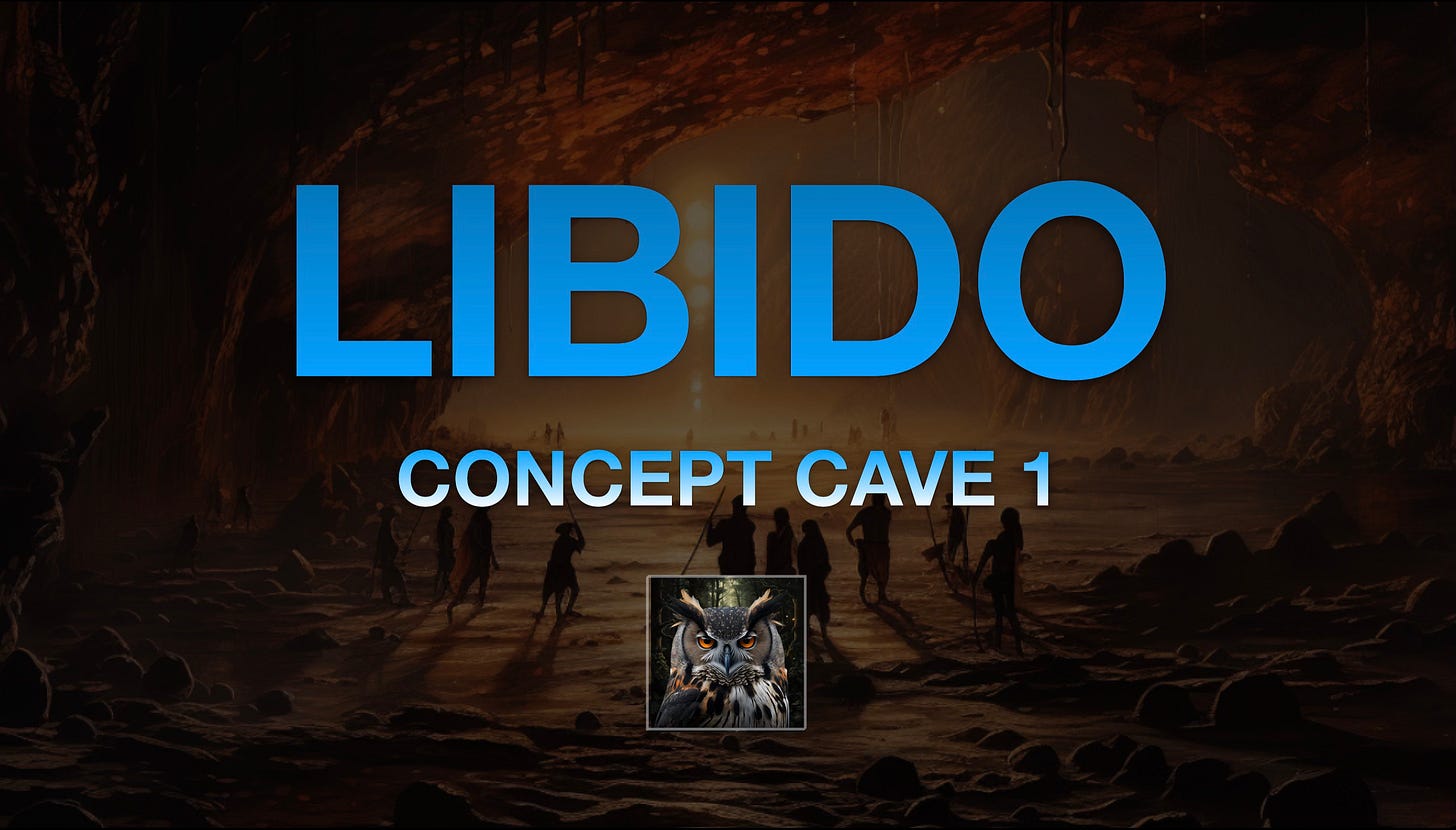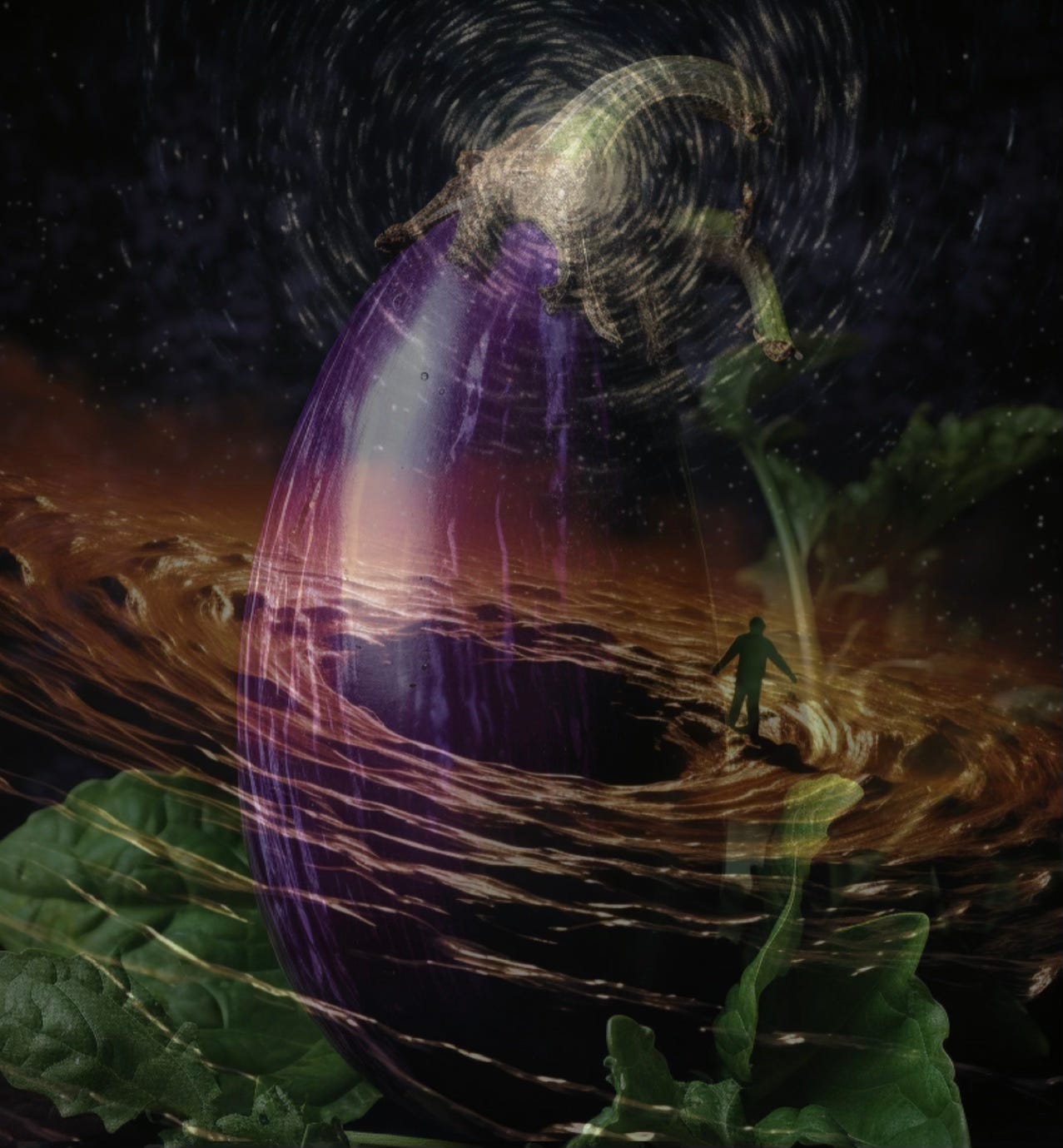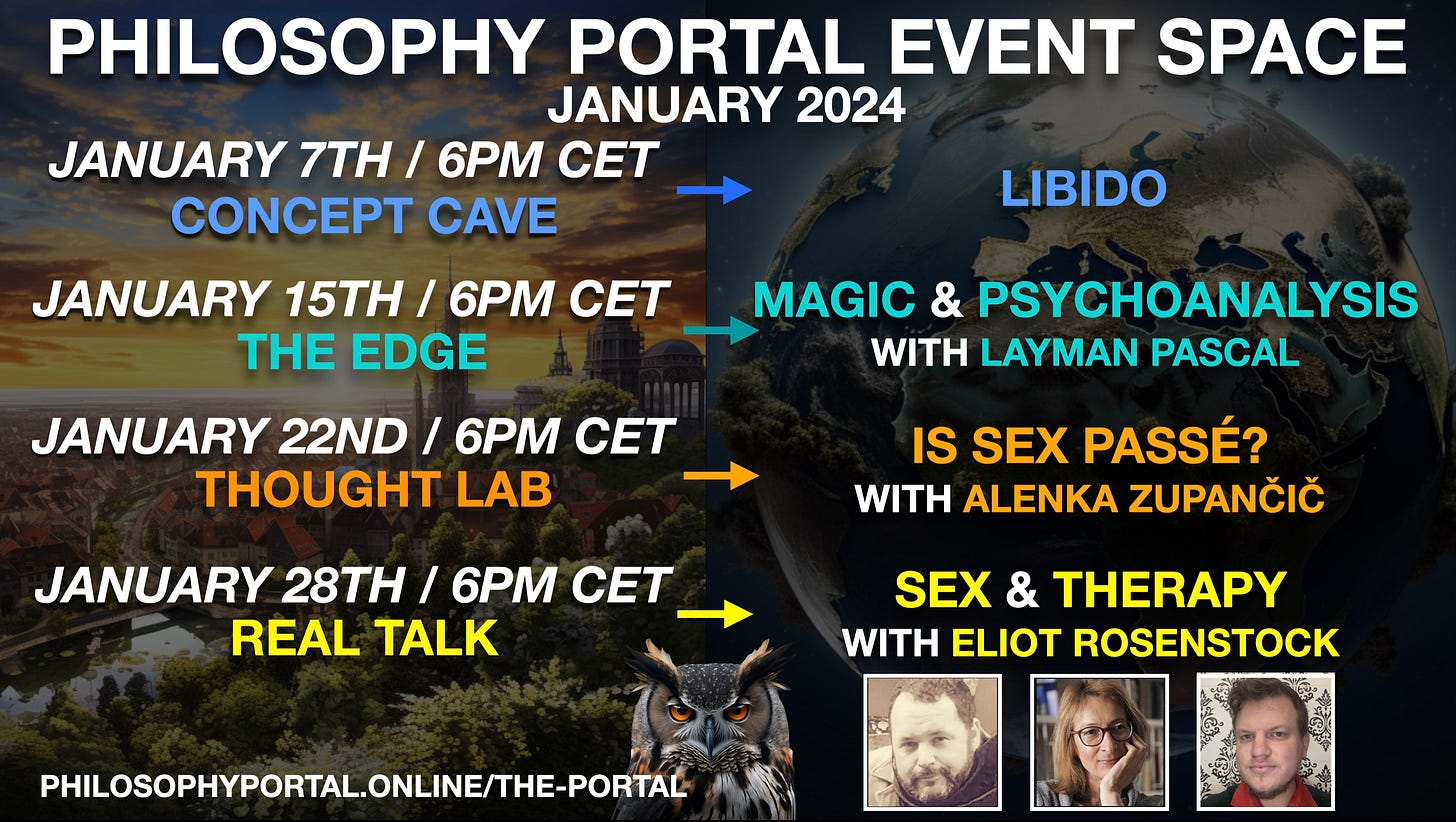Concept Cave is part of the new Philosophy Portal Live Event Space. In January 2024, we will focus on the concept of libido, and explore it through:
Concept Cave (a space to learn fundamental concepts);
The Edge (a space to walk the razor’s edge of contemporary thought and practice),
Thought Lab (a space to learn and think with a thought leader about our shared becoming), and
Real Talk (a space for free association and full speech).
This month meta-shaman
(The Edge), philosopher Alenka Zupančič (Thought Lab), and psychotherapist Eliot Rosenstock (Real Talk) will be joining throughout the month. To find out more about our membership program, check out the Philosophy Portal Live Event Space.Libido is most fundamentally defined as “psychic sexual energy”.1 There are two ways in to understanding the concept of libido qua “psychic sexual energy”, as it appears at the ground of psychoanalytic thought, specifically starting with Freud:
Libido as life force, which is derived from a physics metaphor
Libido as eros, which is derived from Greek mythology
When we think about libido as life force, we are thinking about somatic energy flows that move through bodily orifices (oral, anal, genital, etc.), and generate tensions, both developmentally (from infancy to puberty to adulthood to senescence), as well as structurally (manifesting in systemic-synchronic relations). Here focusing on flows and tensions, both developmentally (over time) and structurally (at a moment of time), Freud started to use the metaphor of a life force to explore libidinal openings and closings. Here he further extended metaphors borrowed from physics of engineering structures, like valves or damns, used to mediate the flows of electricity or water energy during the industrial age.2
In short, from the perspective of libido, what we experience as psychic reality is somatic energy flows and their tensions at different developmental stages and structural moments. As subjects we are not merely passive observers of these processes from the outside, but actively and intimately entangled with these processes from the inside.3 We as subjects “play our part” in-between birth and death to mediate the immediate flows of libido. Here the study of the active psyche, for Freud, started with an analysis of the way the psyche appeared predisposed towards reducing tensions that appeared at various developmental stages and structural moments. This is what becomes nominated as the pleasure principle, i.e. the tendency of our minds to seek gratification as relief and release from bodily tensions.
However, we can also think about libido as eros, which shifts our attention from somatic energy flows to the Greek myth of a primordial god of sex and love. Here we are thinking less “scientifically” and more “spiritually”, which can also mean that we are thinking less about mechanisms (developmental and structural tensions), and more about narratives of how spirit relates to pleasure and the other across time or as a moment of time. For example, we can think about the oscillation of a primordial god in-between the immediate pleasure of sexual gratification and the prolonged mediation in the mystery of loving connection. While the immediate pleasure of sexual gratification reduces the tension that we can find in the “negativity of the other”, the mediation of pleasure/sexual gratification in the power of sublimation opens the conditions of possibility of holding higher tension with the other. This higher-order tension is the mystery of the other, which nevertheless, is always an immense challenge, as the other, does not always correspond to our desire, and is thus always a potential source of negativity or non-pleasure (even death).
In other words, on the level of erotic spirit we have libidinal struggle that breaks out between, not only the immediacy of pleasure and its mediation, but also between the mediation of pleasure and the immediacy that can appear on the other side of mediation. Another way of saying this is that there is a difference between the immediacy of sex with an unmediated other, and the immediacy of sex with a mediated other; or alternatively there is a difference between the immediacy of love with an unmediated other, and the immediacy of love with a mediated other. This difference is the story of eros in which we win and lose sexual gratification as well as loving connection with the other who never quite correlates or corresponds to our desire. We find the truth of the relation in the way we respond to the cracks, gaps, and lacks in the other, the way in which our stories retroactively positivise the cracks, gaps and lacks in the other.
Consequently, there is something of a fundamental frustration that appears and must be sublated in the mediation of these erotic stories, where our intense desire for union with the other is either lost as quickly as it is consummated, or where our intense desire for union is forged in the very fires of negativity that threatens to undermine and corrupt it forever. Moreover, we can never know the end of the story, we will only ever be able to tell the story “after the fact” (at the end), i.e. after we have been willing to live the mystery of it.
But the scientific mechanisms of libido as life force, and spiritual narratives of libido as eros, are not just useful and insightful for thinking about our personal love lives and familial relations. Libido is a concept that can and is extended by the analytic tradition to analyse civilisation as a whole. When we think about civilisation as a whole, the idea is that civilisation itself, as well as all of the stories that compose human history, are built from the delay of immediate pleasure and the capacity to withstand higher order tensions. That is, civilisation itself is built upon the principle of renunciation and sacrifice of what is immediately pleasurable to our psyche for what is beyond our psyche: our family, group or community, city or nation, or even our world civilisation. Here the infamous problem for man’s psyche and the pleasure principle becomes the well-known “discontent” we can feel in shouldering the burden of cultural and civilisational traditions, for the renunciation and sacrifice which does not have an immediate or a guaranteed “return on investment”. We must learn to “love the process”, as is commonly emphasised today, but without a higher logic of renunciation and sacrifice, we can become short-sighted and too narrowly focused on what is and what we think we want, as opposed to what is possible (but beyond our vision), and what we might enjoy in the future (but not know that we want now).
This is one of the central problems we want to refresh and think through this month at Philosophy Portal: the “Month of Libido”. Without a large-scale ethic of renunciation and sacrifice for what is larger than our psyche, our society quickly falls into the perverted instrumentalisation of pleasure which leads us nowhere but into a deadly jouissance (excess of pleasure).4 Is this not the perfect description for a society that has fallen so deeply into the immediacy of the screen-attention economy? Here our psyches tend to translate the immediate pain of existence — that is the non-correspondence of the other to our desires — into an attempt, conscious or unconscious, to kill, destroy or undermine the other, to use the other as a play-thing for our own narcissistic and self-referential fantasmatic enjoyment.5 This not only reduces the other (potentially to a screen-image), but it also debases the other (potentially to a prop in a narcissistic plot for conscious or unconscious revenge).
There is another way. We can find and explore that other way in a power referred to in psychoanalysis as sublimation. This power of sublimation is not the power over the other, but the power to withstand or tarry with the negativity of the other. This is the power to withstand or tarry with the immediacy of the non-correspondence of the other to our desires, to go into the anxiety we may feel about the non-correspondence of the other to our desires, and even find an arousal or a motivation that transcends the immediacy of our satisfaction for the mediation of something beyond ourselves.6 This mediation of the immediate negativity of non-pleasure (without guarantee for a positive result) is the core of the art of sublimation.7 This art is either lost and needs to be reforged in the fires of our social relationships. Or, this is an art we were never actually very good at, and need to create for the first time through courageous experimentation in a developmental stage of civilisation where more is demanded of us structurally, specifically on the level of libido, that is on the level of our psychic sexual energy.8
The stakes? How about the future of:
children?
sexual relationships?
families?
communities?
small businesses?
networks of larger public and private entities?
future of love in general?
Throughout January, not only will we have a chance for a more detailed examination of the concept of libido, including investigations regarding:
Metaphysics of Freud and Jung
Paradox of libido as phallus and signifier
Truth of jouissance in civilisation
Relationship between narcissism and death
As well as a new mythology, proposed by Lacan, and inspired by libido
But we will also have the opportunity to explore Magic and Psychoanalysis with meta-shaman Layman Pascal.9 Here we will put to the test some currently undefined or poorly conceptualised ideas about the role of magic in helping us mediate psychic energy beyond the reduction to our will and deeper into the mystery beyond our will, that is towards the “X” that marks the constitutively unknown variable of our libidinal equations.10
We will also have the opportunity to explore the question of whether “sex is passé” (no longer fashionable) with philosopher Alenka Zupančič.11 Here we will specifically investigate the possibility that sublimation more than compensates us for our sacrifices and renunciations, to investigate the possibility that we may enjoy our culture and civilisation even more than sexuality itself. Here consider a great passage from her text Is Sex Passé?:12
“Lacan’s point is that when we enjoy writing poetry, or talking about it, this enjoyment doesn’t differ in any essential way from, say, enjoyment in sexual intercourse. And the point is not simply about abasement of intellectual activities, it is at least as much about elevating sexuality to a surprisingly intellectual activity.”
But we will also confront weird paradoxes of the increased tension in culture and civilisation, where the truth of jouissance (excessive pleasure), always tends to confront our psyches with all-new challenges that are oftentimes difficult accept, and certainly difficult to talk about. Indeed, these all-new challenges often shatter us and force us to attempt to reconstitute the core of our identities.
Finally, we will have the opportunity to explore our own personal relationship to libido with psychotherapist Eliot Rosenstock. Here we will specifically investigate the relationship between sex and psychotherapy, whether that is in the role sexuality plays in contemporary psychotherapy or other talk therapies, or whether it is the role psychotherapy may play in helping us better come to terms with and express our sexuality (in the fullest sense of the term). Does this sound like a place you want to learn? If so, I hope you join us!
In short, Philosophy Portal is launching its first month of live events. We hope you join us as a member in January and beyond, for what promises to be a new year of experimental collaborations that aim to push the bar of what it means to explore or engage philosophy.
Philosophy Portal members get access to four live events every month, private forum, office hours, community publications, discounts on recorded courses, early bird pricing on future courses, priority access to apply for retreats, and much more to come. To find out more, see: Philosophy Portal Live Event Space.
We should see “psychic sexual energy” as a good starting point for rethinking the scientific universe internal to the scientific universe itself, where we often run into problems of thinking about the psyche or mind that are explicitly or implicitly “de-sexualised” and “de-eroticised” which does not help us, either in terms of understanding the mechanisms of our mind, nor in terms of understanding the narratives of our spirit. This is a path I try to explore in Chapter 2 of Systems and Subjects “Historical Meta-Psychology” (link).
This is a good example of how we must learn to historically contextualise the metaphors used to define a given field, see their strengths and weaknesses, without simply negating or deconstructing. When it comes to the metaphors Freud used to define the original field of psychoanalysis, Freud’s most infamous successor, Jacques Lacan, can be understood to sublate Freud, in the sense of rethinking the metaphors and basic concepts (for example with metaphors derived from structural linguistics), while leaving the truth of the original insights intact, helping us see them as if for the first time.
This is one of the distinctions which disorients and disturbs the relationship between science and psychoanalysis, it is also one of the distinctions that uniquely aligns the philosophical efforts of those thinking and working after Kant’s transcendental turn, which is again a distinction I try to work throughout Systems and Subjects (link).
We should remember that, towards the end of Lacan’s Écrits, we get specific thought experiments against the unreflective instrumentalisation towards deadly jouissance, for example, in “Kant with Sade” (p. 645-668), as well as a full dialectical analysis of the subject and the phallus regarding the logic of renunciation and sacrifice towards a higher order jouissance, for example, in “The Subversion of the Subject and the Dialectic of Desire in the Freudian Unconscious” (p. 671-702). In this latter article, Lacan proposes his dense formula for the stakes of this sacrifice and paradoxical jouissance in accepting symbolic castration: “jouissance has to be refused in order to be attained on the inverse scale of the Law of desire.” (p. 700).
Again, in “Kant with Sade” (p. 645-668 of the Écrits) we find a perfect description of this dark path that leads to nowhere but, not only hell on Earth for ourselves, but also turning Earth into hell for the other.
And also, I think, intimately connected to the mechanism of sublation.
I tend towards this latter explanation, with the “lost art” side of things mostly being covered up by the illusion of religious images/modes of identification to be transcended. I would rather suggest that a scientific universe with the tools of psychoanalysis could start to experiment with these tools “outside of the clinic”, so to speak.
For a preview of some major themes we may explore, check out a talk I hosted with Layman Pascal and Owen Cox of
last month: Xagick.See Pascal’s blog on the topic: Do You Believe in Xagick?
Based on her contribution to
’s 2023 anthology Underground Theory, see: Zupančič, A. 2023. Is Sex Passé? In: Underground Theory. Snelgrove, A., McKerracher, D., Lawrence, M. (Eds.). Theory Underground Publishing. p. 215-226. (link)Ibid. p. 216.







